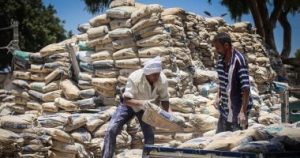Foreign fighters and others who joined the war in Syria from abroad have submitted a request to the new government led by Islamists to obtain citizenship, claiming they deserve it after helping the opposition come to power following the overthrow of former President Bashar al-Assad. The fate of these foreign fighters has become a contentious issue since the new rulers led by Hay’at Tahrir al-Sham came to power, amid reluctance by some countries to repatriate individuals they mostly consider extremists and concerns among some Syrians about their presence.
Many fighters, their families, as well as others such as relief workers and journalists who joined the opposition, lack valid legal documents. Some have been stripped of their original citizenships and fear long prison sentences or even execution in their home countries.
Granting them Syrian citizenship could alienate Syrians and foreign countries, which the new government seeks to win support from while trying to unify and rebuild a country devastated by war and sectarian killings.
A letter submitted to the Syrian Interior Ministry on Thursday, August 14, 2025, seen by Reuters, stated that foreigners should be granted citizenship so they can settle, own land, and travel.
The foreign fighters said in the letter, “We shared bread, sorrows, and hope for a free and just future for Syria… Yet for us – the immigrants – our status remains unclear.” They added, “We respectfully and wisely ask the Syrian leadership, with foresight and brotherhood, to grant us full Syrian citizenship and the right to carry a Syrian passport.”
The letter was submitted by Bilal Abdul Karim, an American comedian turned military correspondent who has lived in Syria since 2012. Abdul Karim is a prominent voice among foreign Islamists in Syria.
He told Reuters by phone that thousands of foreigners from more than 10 countries would benefit from this letter, including Egyptians, Saudis, Lebanese, Pakistanis, Indonesians, Maldivians, as well as British, German, French, American, Canadian, Chechen, and Uyghur nationals.
Reuters could not determine the exact number of supporters of this letter, but three foreigners in Syria—a British, a French, and a Uyghur individual—confirmed their support.
A spokesperson for the Syrian Interior Ministry said that the presidency alone is responsible for decisions on granting citizenship to foreigners. A media official at the presidency did not respond to requests for comment.
In the weeks following the new government’s rise to power, transitional president Ahmed al-Shara, former leader of Hay’at Tahrir al-Sham, said foreign fighters and their families might receive Syrian citizenship, but no reports of such a step have been published.
Some Syrians are concerned that the loyalty of foreign fighters lies more with an overarching Islamist project than with Syria, fearing their supposed extremism. In the months after Bashar al-Assad’s fall, foreign fighters were accused of participating in violence targeting Alawite and Druze religious minorities.
A Reuters investigation into violence that erupted in the Syrian coast in March 2025, which killed over a thousand Alawites, found that Uyghur, Uzbek, Chechen, and some Arab fighters took part in the operations, though most were carried out by Syrian factions.
Thousands of Sunni foreigners flowed into Syria after massive protests in 2011 turned into a sectarian war attracting Shiite militants from across the region.
These foreigners joined various groups, some of which fought Hay’at Tahrir al-Sham, while others earned reputations as tough and loyal fighters relied upon by the group’s leadership even for personal security. Many married and started families.
An Uyghur fighter, who asked to remain anonymous due to sensitivity, said his goal shifted to establishing a life in the new Syria. He added, “I now have a four-year-old child who must start school soon, and I have to think about his future away from jihad battlefields.”
Tawqir Sharif, a relief worker who held British citizenship and has lived in Syria since 2012, told Reuters in May 2025 that foreigners who contributed to society deserve citizenship.
Sharif was stripped of his British citizenship in 2017 over alleged links to a group associated with Al-Qaeda, which he denies. He said, “The immigrants who came are not killers but lifesavers who came here to stop oppression.”
Syria appointed foreign fighters to military leadership positions after Assad’s ouster in December 2024. The new Syrian authorities received a green light from the United States to integrate several thousand into the army and assigned foreigners other roles.
Supporters of granting foreign fighters Syrian citizenship say it would make them accountable under the country’s law. Abdul Karim, a critic of Hay’at Tahrir al-Sham and the new Syrian leadership, said, “That would be the just outcome for the sacrifices made by the young brothers and sisters to liberate the country from Bashar al-Assad’s grip.”
Orwa Ajoub, a Syrian analyst studying armed groups since 2016, said this issue should be addressed through dialogue with various segments of Syrian society, which still holds differing opinions on the matter.













Recommended for you
Exhibition City Completes About 80% of Preparations for the Damascus International Fair Launch
Talib Al-Rifai Chronicles Kuwaiti Art Heritage in "Doukhi.. Tasaseem Al-Saba"
Unified Admission Applications Start Tuesday with 640 Students to be Accepted in Medicine
Egypt Post: We Have Over 10 Million Customers in Savings Accounts and Offer Daily, Monthly, and Annual Returns
His Highness Sheikh Isa bin Salman bin Hamad Al Khalifa Receives the United States Ambassador to the Kingdom of Bahrain
Al-Jaghbeer: The Industrial Sector Leads Economic Growth